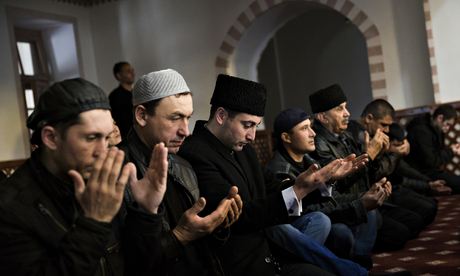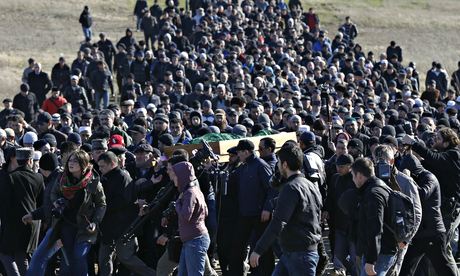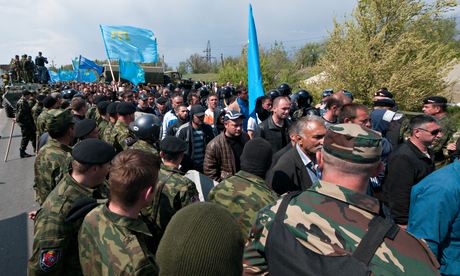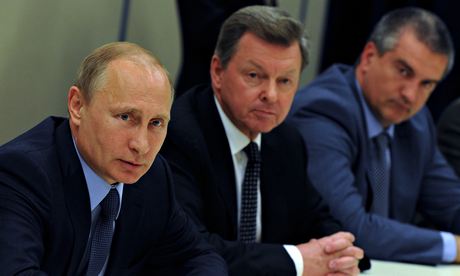Vladimir Putin tells Crimea's Tatars their future lies with Russia
UN warns Muslim minority has suffered harassment and persecution since peninsula was annexed from Ukraine

Tatar men pray in the Kebir-Dzhami mosque in Simferopol, Crimea. Photograph: Thomas Peter/Reuters
Vladimir Putin has told Crimea's Tatars that they must accept
that their future lies with Russia, on the eve of the 70th anniversary
of their mass deportation from their ancestral homeland.
Putin's comments came as the UN warned that the Tatars have been the subject of harassment and persecution since the Black Sea peninsula was annexed from Ukraine in March.
Speaking after meeting Tatar representatives, Putin said: "Today we must all realise that the interests of the Crimean Tatars today are tied to Russia."
He said: "We are ready to work with all people" but added: "None of us can allow the Crimean Tatar people to become a bargaining chip in disputes … especially in disputes between Russia and Ukraine."
Meanwhile, Crimea's prime minister issued a decree forbidding all public demonstrations until 6 June, in an apparent attempt to prevent the annual rally on Sunday commemorating Stalin's deportation of the Tatars in 1944.
Sergei Aksyonov said the ban was necessary to avoid "provocations by extremists" and "disruption to the resort season".
But thousands of Tatars are expected to gather for an event that experts say will determine the course of the burgeoning conflict between the Tatars and the pro-Russia regional government.
Tensions between the Tatars and Crimea's ethnic Russians have grown steadily since the independence referendum in March. Most Russian speakers supported the move to join Russia; the Tatars – a Muslim minority who make up about 12% of the population – largely boycotted the vote and wanted to remain in Ukraine.

Putin's comments came as the UN warned that the Tatars have been the subject of harassment and persecution since the Black Sea peninsula was annexed from Ukraine in March.
Speaking after meeting Tatar representatives, Putin said: "Today we must all realise that the interests of the Crimean Tatars today are tied to Russia."
He said: "We are ready to work with all people" but added: "None of us can allow the Crimean Tatar people to become a bargaining chip in disputes … especially in disputes between Russia and Ukraine."
Meanwhile, Crimea's prime minister issued a decree forbidding all public demonstrations until 6 June, in an apparent attempt to prevent the annual rally on Sunday commemorating Stalin's deportation of the Tatars in 1944.
Sergei Aksyonov said the ban was necessary to avoid "provocations by extremists" and "disruption to the resort season".
But thousands of Tatars are expected to gather for an event that experts say will determine the course of the burgeoning conflict between the Tatars and the pro-Russia regional government.
Tensions between the Tatars and Crimea's ethnic Russians have grown steadily since the independence referendum in March. Most Russian speakers supported the move to join Russia; the Tatars – a Muslim minority who make up about 12% of the population – largely boycotted the vote and wanted to remain in Ukraine.

Crimean Tatars gather at a cemetery outside Simferopol for the
funeral of Reshat Ametov, who disappeared and was later found dead after
protesting against the Russian takeover of Crimea. Photograph: Vasily
Fedosenko/Reuters
On the day of the referendum, the body of Reshat Ametov, a Tatar who
had protested against the seizure of the peninsula by Russian troops,
was found with signs he had been tortured.
He had last seen alive in video footage showing unmarked men in camouflage leading him away from a protest in Simferopol's Lenin Square.
"It's like when we came in the 1990s, they looked at us askance. It's the same way now," said his wife, Zarina Ametova. "They look at us like an enemy."
Aksyonov has denied that local militias had anything to do with Ametov's murder, which remains unsolved. But many fear the murder was the start of a campaign of violence and political persecution against the Tatars.
The US assistant secretary of state for European and Eurasian affairs, Victoria Nuland, told Congress this month: "We are extremely concerned about the human rights situation for all Crimeans but notably for Tatars."
In a report released on Friday, the UN high commissioner for human rights, Navi Pillay, said the Tatars faced numerous problems including physical harassment, fear of religious persecution and internal displacement.
The report warned of an "alarming deterioration" of human rights in eastern Ukraine, where it said insurgent groups had carried out "targeted killings, torture and beatings, abductions, intimidation and some cases of sexual harassment".
 Crimean Tatars protest on 3 May after their unofficial leader
Mustafa Dzhemilev was banned from re-entering the peninsula. Photograph:
Alexander Polegenko/AP
Crimean Tatars protest on 3 May after their unofficial leader
Mustafa Dzhemilev was banned from re-entering the peninsula. Photograph:
Alexander Polegenko/AP
He had last seen alive in video footage showing unmarked men in camouflage leading him away from a protest in Simferopol's Lenin Square.
"It's like when we came in the 1990s, they looked at us askance. It's the same way now," said his wife, Zarina Ametova. "They look at us like an enemy."
Aksyonov has denied that local militias had anything to do with Ametov's murder, which remains unsolved. But many fear the murder was the start of a campaign of violence and political persecution against the Tatars.
The US assistant secretary of state for European and Eurasian affairs, Victoria Nuland, told Congress this month: "We are extremely concerned about the human rights situation for all Crimeans but notably for Tatars."
In a report released on Friday, the UN high commissioner for human rights, Navi Pillay, said the Tatars faced numerous problems including physical harassment, fear of religious persecution and internal displacement.
The report warned of an "alarming deterioration" of human rights in eastern Ukraine, where it said insurgent groups had carried out "targeted killings, torture and beatings, abductions, intimidation and some cases of sexual harassment".
 Crimean Tatars protest on 3 May after their unofficial leader
Mustafa Dzhemilev was banned from re-entering the peninsula. Photograph:
Alexander Polegenko/AP
Crimean Tatars protest on 3 May after their unofficial leader
Mustafa Dzhemilev was banned from re-entering the peninsula. Photograph:
Alexander Polegenko/AP
The UN highlighted the case of the Crimean Tatars' unofficial leader,
Mustafa Dzhemilev, a Ukrainian MP and former Soviet dissident, who was
banned from the peninsula after he left for meetings in Kiev and was not
allowed back in.
Dzhemilev has set the tone for the Tatar people and their self-governing Mejlis council by refusing to recognise the new pro-Russia government and the referendum to join Russia, even telling the Russian president, Vladimir Putin, to withdraw Russian troops in a phone call before the vote.
"They want to make us all Russian citizens, but there's no democracy in Russia," Dzhemilev said. "We're used to living more freely."
After Dzhemilev was denied entry to Crimea for the second time on 3 May, more than 1,000 Tatars closed roads around the peninsula in protest.
In response, Crimea's chief prosecutor, Natalia Poklonskaya, said last week that members of the Mejlis were suspected of "extremist activity" and that the council could be "liquidated".
Sahri Mustafayev, one of those who closed roads, said he had been fined 15,000 rubles (£260) last week along with at least 10 others, adding that 200 others also faced fines. But he plans to appeal against the decision, and the harsh measures seem to have only hardened protesters' resolve.
"I'm a Crimean Tatar, why can't I say what I want?" Mustafayev said. "This is our homeland. We have nowhere else to go. I would rather die here than listen to this new government.
"We're waiting for what the Mejlis will say to us. If they say rise up, we will," he said, but added that Tatars were also waiting for the results of the Ukrainian presidential election on 25 May, in which many of them hope to vote.
Dzhemilev said the Mejlis was split on whether to refuse to cooperate with the new government, but he thought it would have to compromise.
The political tension has been exacerbated by incidents such as one in which a 14-year-old Crimean Tatar was beaten by unknown men who reportedly said Tatars should be kicked off the peninsula.
 Russian president Vladimir Putin, his envoy to Crimea Oleg
Belaventsev and Crimean PM Sergei Aksyonov meet Tatar representatives in
Sochi, Russia, on Friday. Photograph: Mikhail Klimentyev/AP
A member of the Mejlis, Abduraman Egiz, was beaten on camera last
week by men who he said identified themselves as members of a pro-Russia
self-defence unit and demanded to check his documents.
Russian president Vladimir Putin, his envoy to Crimea Oleg
Belaventsev and Crimean PM Sergei Aksyonov meet Tatar representatives in
Sochi, Russia, on Friday. Photograph: Mikhail Klimentyev/AP
A member of the Mejlis, Abduraman Egiz, was beaten on camera last
week by men who he said identified themselves as members of a pro-Russia
self-defence unit and demanded to check his documents.
Tatar leaders are calling for the liquidation of self-defence forces, which have been a major issue of contention for the community.
"They say they ensure law and order. We think that they don't ensure it, they start conflicts," Egiz said, adding that beatings were on the rise. "They're dangerous in Crimea. They destabilise the situation."
Local police did not respond to requests for comment.
According to the independent Crimean political analyst Sergei Kostinsky, the Kiev government had previously kept discrimination against Tatars by the Crimean government in check.
Despite a promise by Putin last month to deal with issues including housing for Crimean Tatars, Kostinsky said Moscow has yet to take serious steps to rein in "Crimean chauvinism". Russians are beginning to express old biases in everyday life, he said.
Kostinsky attributed the pressure on Tatar political leaders to the Kremlin's attempt to crush opposition to its rule in Crimea and eventually divide the Tatars politically.
"Today Crimea is supposed to be a window exhibit for Russia, the world community, Ukraine," he said. "There's supposed to be mass support for Russia here, and if there is 12% to 20% of the population that considers itself to be Ukrainian it will ruin the picture and negatively affect the image of Russia, which says that the Crimeans invited it to invade."
About 1,500 Crimean Tatars have fled to western Ukraine, most of them fearing religious persecution, according to Rustem Ablyatifov, a Crimean Tatar who heads the pro-European integration NGO Institute for a Civil Society.
Dzhemilev has said a total of 5,000 Crimean Tatars have had to leave since the Russian takeover. Ablyatifov fled to Lviv because he was afraid of retaliation for his active support of the Euromaidan protests in Kiev after security services followed him and tried to arrest him, he said.
"When they detained us they shouted: 'We'll deal with you Muslims, we'll show you!'" he said.
About 30 Crimean Tatars have received political asylum in Poland, according to Ismail Ismailov, a pro-Euromaidan activist who has himself fled to Azerbaijan.
"The chauvinists have more government posts now. They feel more confident, and they will constantly put pressure on Crimean Tatars," Ismailov said.
For now, the conflict has yet to affect the daily lives of most Tatars. At the Khan's Palace in Bakhchysarai, the historical capital of the Crimean Tatars, tourists and a Russian wedding party posed for photographs on Sunday as Tatars sat outside the mosque.
At the city bazaar, where Russians and Tatars hawk their wares side by side, a Russian, Viktoria Bayeva, said that "everything seems friendly" for now.
"Of course we're worried, we're worried about the future of our children, but we hope it will be OK," said a Tatar woman named Sabina, who was sitting with her two daughters outside the mosque.
"For now the conflict isn't touching these peaceful women, but it could touch their husbands and brothers," said Nadzhie Femi, a local journalist who writes for Radio Free Europe.
"When they forbid a Tatar, especially one of such status as Dzhemilev, to enter Crimea … it's interpreted as the start of bigger repressions".
Dzhemilev has set the tone for the Tatar people and their self-governing Mejlis council by refusing to recognise the new pro-Russia government and the referendum to join Russia, even telling the Russian president, Vladimir Putin, to withdraw Russian troops in a phone call before the vote.
"They want to make us all Russian citizens, but there's no democracy in Russia," Dzhemilev said. "We're used to living more freely."
After Dzhemilev was denied entry to Crimea for the second time on 3 May, more than 1,000 Tatars closed roads around the peninsula in protest.
In response, Crimea's chief prosecutor, Natalia Poklonskaya, said last week that members of the Mejlis were suspected of "extremist activity" and that the council could be "liquidated".
Sahri Mustafayev, one of those who closed roads, said he had been fined 15,000 rubles (£260) last week along with at least 10 others, adding that 200 others also faced fines. But he plans to appeal against the decision, and the harsh measures seem to have only hardened protesters' resolve.
"I'm a Crimean Tatar, why can't I say what I want?" Mustafayev said. "This is our homeland. We have nowhere else to go. I would rather die here than listen to this new government.
"We're waiting for what the Mejlis will say to us. If they say rise up, we will," he said, but added that Tatars were also waiting for the results of the Ukrainian presidential election on 25 May, in which many of them hope to vote.
Dzhemilev said the Mejlis was split on whether to refuse to cooperate with the new government, but he thought it would have to compromise.
The political tension has been exacerbated by incidents such as one in which a 14-year-old Crimean Tatar was beaten by unknown men who reportedly said Tatars should be kicked off the peninsula.
 Russian president Vladimir Putin, his envoy to Crimea Oleg
Belaventsev and Crimean PM Sergei Aksyonov meet Tatar representatives in
Sochi, Russia, on Friday. Photograph: Mikhail Klimentyev/AP
A member of the Mejlis, Abduraman Egiz, was beaten on camera last
week by men who he said identified themselves as members of a pro-Russia
self-defence unit and demanded to check his documents.
Russian president Vladimir Putin, his envoy to Crimea Oleg
Belaventsev and Crimean PM Sergei Aksyonov meet Tatar representatives in
Sochi, Russia, on Friday. Photograph: Mikhail Klimentyev/AP
A member of the Mejlis, Abduraman Egiz, was beaten on camera last
week by men who he said identified themselves as members of a pro-Russia
self-defence unit and demanded to check his documents.Tatar leaders are calling for the liquidation of self-defence forces, which have been a major issue of contention for the community.
"They say they ensure law and order. We think that they don't ensure it, they start conflicts," Egiz said, adding that beatings were on the rise. "They're dangerous in Crimea. They destabilise the situation."
Local police did not respond to requests for comment.
According to the independent Crimean political analyst Sergei Kostinsky, the Kiev government had previously kept discrimination against Tatars by the Crimean government in check.
Despite a promise by Putin last month to deal with issues including housing for Crimean Tatars, Kostinsky said Moscow has yet to take serious steps to rein in "Crimean chauvinism". Russians are beginning to express old biases in everyday life, he said.
Kostinsky attributed the pressure on Tatar political leaders to the Kremlin's attempt to crush opposition to its rule in Crimea and eventually divide the Tatars politically.
"Today Crimea is supposed to be a window exhibit for Russia, the world community, Ukraine," he said. "There's supposed to be mass support for Russia here, and if there is 12% to 20% of the population that considers itself to be Ukrainian it will ruin the picture and negatively affect the image of Russia, which says that the Crimeans invited it to invade."
About 1,500 Crimean Tatars have fled to western Ukraine, most of them fearing religious persecution, according to Rustem Ablyatifov, a Crimean Tatar who heads the pro-European integration NGO Institute for a Civil Society.
Dzhemilev has said a total of 5,000 Crimean Tatars have had to leave since the Russian takeover. Ablyatifov fled to Lviv because he was afraid of retaliation for his active support of the Euromaidan protests in Kiev after security services followed him and tried to arrest him, he said.
"When they detained us they shouted: 'We'll deal with you Muslims, we'll show you!'" he said.
About 30 Crimean Tatars have received political asylum in Poland, according to Ismail Ismailov, a pro-Euromaidan activist who has himself fled to Azerbaijan.
"The chauvinists have more government posts now. They feel more confident, and they will constantly put pressure on Crimean Tatars," Ismailov said.
For now, the conflict has yet to affect the daily lives of most Tatars. At the Khan's Palace in Bakhchysarai, the historical capital of the Crimean Tatars, tourists and a Russian wedding party posed for photographs on Sunday as Tatars sat outside the mosque.
At the city bazaar, where Russians and Tatars hawk their wares side by side, a Russian, Viktoria Bayeva, said that "everything seems friendly" for now.
"Of course we're worried, we're worried about the future of our children, but we hope it will be OK," said a Tatar woman named Sabina, who was sitting with her two daughters outside the mosque.
"For now the conflict isn't touching these peaceful women, but it could touch their husbands and brothers," said Nadzhie Femi, a local journalist who writes for Radio Free Europe.
"When they forbid a Tatar, especially one of such status as Dzhemilev, to enter Crimea … it's interpreted as the start of bigger repressions".
No comments:
Post a Comment
Please leave a comment-- or suggestions, particularly of topics and places you'd like to see covered